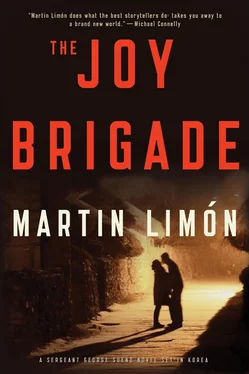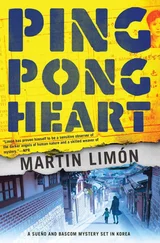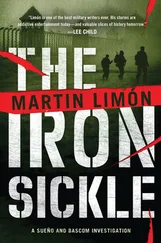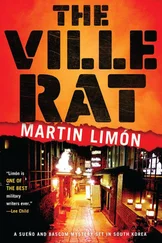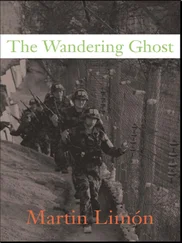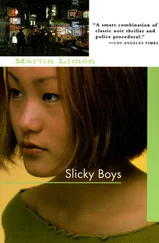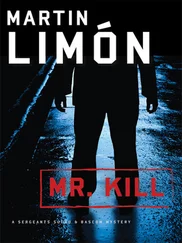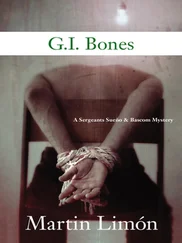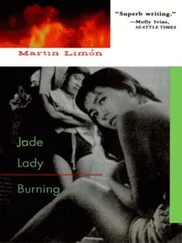Martin Limon - Joy Brigade
Здесь есть возможность читать онлайн «Martin Limon - Joy Brigade» весь текст электронной книги совершенно бесплатно (целиком полную версию без сокращений). В некоторых случаях можно слушать аудио, скачать через торрент в формате fb2 и присутствует краткое содержание. Жанр: Полицейский детектив, на английском языке. Описание произведения, (предисловие) а так же отзывы посетителей доступны на портале библиотеки ЛибКат.
- Название:Joy Brigade
- Автор:
- Жанр:
- Год:неизвестен
- ISBN:нет данных
- Рейтинг книги:5 / 5. Голосов: 1
-
Избранное:Добавить в избранное
- Отзывы:
-
Ваша оценка:
- 100
- 1
- 2
- 3
- 4
- 5
Joy Brigade: краткое содержание, описание и аннотация
Предлагаем к чтению аннотацию, описание, краткое содержание или предисловие (зависит от того, что написал сам автор книги «Joy Brigade»). Если вы не нашли необходимую информацию о книге — напишите в комментариях, мы постараемся отыскать её.
Joy Brigade — читать онлайн бесплатно полную книгу (весь текст) целиком
Ниже представлен текст книги, разбитый по страницам. Система сохранения места последней прочитанной страницы, позволяет с удобством читать онлайн бесплатно книгу «Joy Brigade», без необходимости каждый раз заново искать на чём Вы остановились. Поставьте закладку, и сможете в любой момент перейти на страницу, на которой закончили чтение.
Интервал:
Закладка:
They were still torturing Moon Chaser. His screams had been reverberating through my skull for days. It was my fault he’d been caught. It was my fault he was suffering. Finally, I couldn’t take it any longer. I broke down and told Captain Rhee about the manuscript of the wild man. She sat up as I spoke. I knew I’d caught her interest.
“Stop torturing him now,” I said.
She snapped her fingers. A guard came in. She barked the order, and two minutes later the screaming stopped.
“Tell me,” she commanded.
I told her of the tunnel through the Kwangju Mountains, impossible to discover except by the “wild man” who seemed to have some sixth sense that guided him through the bowels of the earth.
“It leads where?” she asked me breathlessly.
I was about to tell her when a bomb went off.
Quickly, she slipped back into her clothes, pulled on her boots, and ran outside. I sat on the metal bench, listening to the gunfire all around me, men shouting in anger and in terror.
A half-hour later, armed men burst into the dungeon. Some of them were spattered with blood. All of them were dirty and perspiration dripped from their foreheads. One of them held a ring of keys and he knelt and unshackled me. I was still naked.
Doctor Yong In-ja, holding a Kalashnikov rifle across her chest, strode between the men. “Find him some clothes,” she ordered. “Then bring him.”
Without saying a word to me, she swiveled and returned to the fight.
The redoubt high on the edge of Mount O-song was carefully camouflaged. Canvas netting strewn with weeds covered most of the buildings and some of them were sheltered beneath natural rock overhangs.
Doc Yong personally supervised my recovery. It didn’t take long. Most of my wounds were superficial. The avaricious Senior Captain Rhee Mi-sook had merely exhausted me. It was Moon Chaser who’d been methodically ripped to shreds. The soldiers of the Manchurian Battalion rescued him from the Eastern Star Commune but he hadn’t survived the retreat up into the Kwangju Mountains. His body was carried the rest of the way and buried, with honors, within one of the grave mounds reserved for the martyrs of the Manchurian Battalion.
When I was well enough, Doc Yong introduced me to Il-yong, the First Dragon, my son. My first glimpse of him was like an awakening in my soul. Now I lived for him, not for myself. He was a bright-eyed boy who loved to smile. I thought he looked like her. She said he looked like me. He noticed everything and I told Doc Yong that that part was definitely like her. I prayed that he’d inherited her brains.
The raid on the Eastern Star Commune had killed a few North Korean soldiers and chased the rest away, including, presumably, Senior Captain Rhee Mi-sook. Immediately, I told Doc Yong everything I knew about the plan to deploy the Red Star Brigade first to a village near Hamhung, and then from there up into the Kwangju Mountains for the assault on the Manchurian Battalion. She nodded gravely. That matched intelligence they’d already gathered.
I spilled my guts about the order of battle and the notes that I’d taken in the catacombs of the Joy Brigade. Somehow, in all the madness since then, the notes had been lost.
“Here,” Doc Yong said, sitting me at a wooden desk and handing me a pencil and a pad of paper. “Put down everything you can remember.” She poured me a cup of barley tea and left the room. The silence grew. I remembered Beikyang and the red star hitting the butt of a white goat, but after that, not much.
Eventually, I gave up and found Doc Yong.
“Keep trying,” she said. “Maybe in your dreams some of it will come back to you.”
I also told her about Hero Kang and his daughter, Hye-kyong, and the holding action of assaulting the petroleum transport convoy.
Another ceremony was held, honoring them. A single carved memorial was erected.
At night, Doc Yong and I lay in bed together. Beside us, on a small mat, Il-yong breathed softly. I lay awake, staring at the moonlight seeping through an oil-papered window, my happiness complete. Or almost. Thoughts of Senior Captain Rhee Mi-sook remained, like a she-demon stalking me.
During the day, with Il-yong strapped to Doc Yong’s back, she gave me a complete tour of the grounds. To the north, twin peaks protected the mountain valley from the cold winds. To the south loomed Mount O-song. Thus sheltered, the valley had a surprisingly temperate climate that allowed the men and women of the Manchurian Battalion to work the land and raise many of their own crops. Not rice but cabbage and turnips and carrots and even a small grove of pear trees. The streams provided some fish, and for the rest of their sustenance, they traded with the collective farms in the valley below. Sometimes, when out of political favor, they had to travel far afield to purchase the rations that the central government supposedly provided free. But they had allies everywhere; people who secretly admired not only the valiant history of the Manchurian Battalion but also their independence.
Everywhere I went, people bowed to me and smiled. Doc Yong had been raised in South Korea and knew the truth about the government down there. It was corrupt and had its faults, and the southern economy was still suffering from the devastation of the Korean War, but fundamentally people were free. Doc Yong had spoken of these things at village meetings and reassured the leadership that the Americans were no longer the enemy of the North Korean people. Compromises could be reached. Peace negotiated. The United States, she promised everyone, was reasonable. Most importantly, the U.S. might be able to help the Manchurian Battalion maintain their independence.
That’s why I received so many smiles.
I thought of these things as I lay in bed next to Doc Yong. My belly was full with roast mackerel and kokktugi, pickled turnip, and heaping white bowls of steamed rice. I was satisfied, for once in my life, worried only about how I could provide help to these people. And how I’d be able to get Doc Yong and Il-yong back to South Korea.
Outside, wood clumped on stone. Rhythmically. I sat up in bed. Carefully, so as not to wake Doc Yong, I stood and slid open the small wood-paneled window.
A dark figure stalked away, like a fat blackbird with long, skinny legs. I stared at the figure in the glimmering moonlight, figuring that my eyesight must be going. Had Captain Rhee Mi-sook hit me so hard that she damaged my ocular nerve in some way? I rubbed my eyes and looked again. Still the same husky figure with stick-like legs. Then it rounded a corner and disappeared in shadow.
When I slid shut the window, Doc Yong, wearing her cotton nightgown, sat on our sleeping mat, eyes wide, waiting for me. I sat down next to her.
“What was that?” I whispered.
“Our leader,” she said.
“Your leader? That was a man?”
“Very much a man,” she said. “Tomorrow you will meet him.”
Bandit Lee, the commander of the Manchurian Battalion, wore his wool uniform draped with metals from the campaigns against the Japanese colonialists and the war against the Yankee imperialists. His name had been acquired when he fought the Japanese Imperial Army in the vast wilderness of Manchuria and in the northern mountains of Korea. In those days, his enemies had thought of him not as a revolutionary but as a bandit.
He had broad shoulders and a thick waist, but at the knees his legs stopped. He stood on two wooden stumps. Doc Yong had told me earlier that he could’ve replaced the wooden stumps with more expensive prosthetics, or simply covered them with his trouser legs, but Bandit Lee eschewed both options. He wanted the world to see what had been done to him.
But the worst damage was not done to his legs. After all, war veterans without limbs were commonplace throughout the world. The most hideous part of his body was his face. Every inch of flesh had been charred, melted by American-manufactured napalm. North Korea-from coast to coast, from the DMZ to the Chinese border-had been saturated with the burning chemical during the Korean War. Bandit Lee had been one of its tens of thousands of victims. One who had survived. His face was not capable of expression. His nose was like a charred lump of coal, his mouth a wrinkled ebony slit. Red eyes stared out at the world as if from behind a mask. When he spoke, the words seemed burnt, escaping from a charred throat. His tongue flicked red, like a serpent emerging from a blackened hole.
Читать дальшеИнтервал:
Закладка:
Похожие книги на «Joy Brigade»
Представляем Вашему вниманию похожие книги на «Joy Brigade» списком для выбора. Мы отобрали схожую по названию и смыслу литературу в надежде предоставить читателям больше вариантов отыскать новые, интересные, ещё непрочитанные произведения.
Обсуждение, отзывы о книге «Joy Brigade» и просто собственные мнения читателей. Оставьте ваши комментарии, напишите, что Вы думаете о произведении, его смысле или главных героях. Укажите что конкретно понравилось, а что нет, и почему Вы так считаете.
